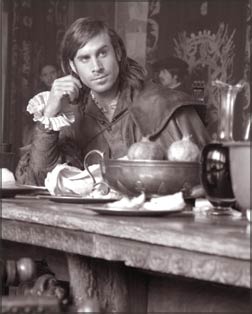|
observer |
|
|
|
|
|
OTHER LINKS |

|

|

|
|
GCE A/L English Literature - Made Easy - Drama The Merchant of Venice - by William ShakespeareAct 2 scene 9General Summary of Act 2 Scene 9The scene is in Belmont. The arrival of the Prince of Arragon to try his luck. Having conceived that he'll respect Portia's father's rules and that he would never reveal his choice to anyone. He'll not seek the hand of another woman. Having rejected the lead casket and his choice being the silver casket 'who chooseth me shall get as much as he deserves.' Seeing the portrait of a blinking idiot, the Prince of Arragon departs leaving Portia relieved of the situation. "O, these deliberate fools! When they do choose They have the wisdom by their wit to lose." A servant announces the arrival of a Venetian ambassador "So likely an ambassador of Love" "Come, Come Nerissa for I long to see Quick cupid's post that comes so mannerly" CommentaryThis scene highlights Prince Arragon's choice of caskets. The Prince Morocco's choice - the golden casket - the most desirable choice. Being a proud man with "a fiery charismatic bearing" Shakespeare has made his characters suggest their "primary qualities Arragon, suggesting 'arrogant'. The uncertain inscriptions puzzling the reader/spectator. The paradox related to the metals and their inscriptions. Prince Morocco's choice the golden casket and his absolute "Assumption of his own superiority to the multitude". Prince Arragon's choice, the silver casket prompting observations on 'merit'. The whole scene is a reflection of Prince Arragon's attitudes. "With one fool's head I came to woo But I go away with two, "Sweet, adieu I'll keep my oath Patiently to bear my wroth." Gold and Silver, the choice of the two suitors - suggesting imperfection. Both suitors do not appear to be truly in love with Portia. Bassanio, who truly loves Portia will choose the casket that appears the is least valuable, which turns out to be the most valuable depending on intelligence. In this play. "it is not glory (Prince Morocco) nor nobility or social status (Prince Arragon) wealth (Shylock) but love for another human being, which Bassanio and Portia clearly offer to one another." Thus the "Love Plot" in this drama resembles a lovely story in which the beautiful Princess, Portia is won by Love and succession of the choice. Act 3 Scene ISummaryVenice. Solanio and Salerio engage in a discussion - "the latest news on the Rialto," the bridge in Venice, a place where a lot of business offices exist. The rumour about Antonio's ships facing disaster bereft of hopes refers to Antonio's bad luck and the arrival of Shylock on the scene, lashing at Solanio and Salerio. Finding fault with both of them for aiding Jessica's elopement. They mock at him saying "There is more difference between thy flesh and hers than between jet and ivory, more between your blood than there is between red wine and Rhenish" Shylock's friend Tabal enters the scene and Shylock moans about his losses - diamonds and ducats and Jessica too. Tubal mentions about Antonio's misfortunes. "But Santonio is certainly undone" creating the happy situation for Shylock. CommentaryThe opening scene with Solanio and Salerio unfolding the information to the audience of the "Development of events of the scene which will take place." The earlier announcement about Antonio's "mercantile ventures" at sea getting involved in a wreck, the news of which prepares the audience for the cruel procedure ahead by Shylock and at the same time discovering Jessica's element. Solanio's greetings full of bitter mockery, Shylock's anger fueled by Jessica's elopement and his hatred towards the Christian community, and inauspiciously speaks out "Let him look to his bond" declaring "it will feed nothing else, it will revenge.
Shakespeare usually uses prose to create the dramatic atmosphere in a homely manner, thus regulating the tension prevailing. Solanio and Salerio seem to produce the most dramatic speeches in the play" Shylock accusing the Christians in a rhetorical manner invites the attention of the audience. "I am a Jew. Hath not a Jew eyes? Hath not a Jew hands, organs dimensions, senses, affection, passion? Fed with the same food, hurt with the same weapons, subject to the same disease, healed by the same means, warmed and cooled by the same winter and summer as a Christian is? Shylock's speech on revenge could easily silence the audience. It is a great plea obtaining a remarkable and shining place in dramatic Literature. The powerful and unanswerable repetition of the word Revenge resembles a refrain of the word. "If a Christian wrongs a Jew what should his sufferance be by Christian example? Why, revenge! The villainy you teach me I will execute, and it shall go hard but I will better the instruction." Shylock's speech on Revenge is "Powerful and so unanswerable that it is lost on Salerio and Solanio, who are none too bright anyway but their silence on stage stuns us." Thus Shakespeare invites the sympathy of the audience towards Shylock and at the same time shows the audience the other side of Shylock's mentality, his excessive concern for possessions, wealth, coming to the conclusion that Shylock is a miser. He is not capable of distinguishing between his excessive Love for riches and his Love and affection for his only daughter. Shylock's hatred for Antonio and for his daughter's choice (a Christian as husband) is symbolically highlighted. "Nor, no ill luck stirring but what lights o'my shoulders, no sighs but o' my breathing no tears but o' my shedding." Mrs. C. Ekanayake, Retd. Specialist Teacher English, St. Anne's College, Kurunegala. |









